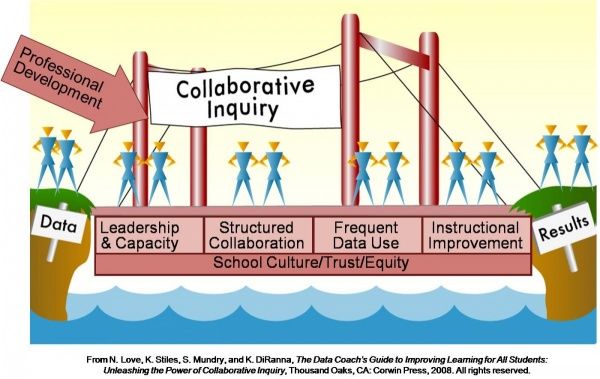Bridging the Data Divide
Data offer us one of the most powerful levers educators have to improve student achievement, and yet they remain woefully underutilized. To bridge the gap between the data that schools have and the results that they want for students, RBT partners with schools and districts to develop high-performing data teams (usually school-wide) and professional learning communities (teams of teachers who teach the same grade and/or content), who are skilled in using data collaboratively, continuously, and effectively to directly impact students and their learning.
As the graphic below illustrates, we believe that the bridge between data and results is collaborative inquiry. When educators work together to identify a common student-learning problem/goal and generate and test out solutions together through rigorous use of data and ongoing reflective dialogue, they improve results for students.
Four Critical Supports for
Collaborative Inquiry

Successful collaborative inquiry is easier said than done. That’s why RBT focuses these four critical supports:
1) Building the leadership and capacity of data coaches and teacher leaders to:
- Facilitate data teams and professional learning communities (PLCs)
- Promote data and assessment literacy
- Engage in productive item, error, and criteria analysis
- Apply collaborative inquiry and dialogue skills
- Strengthen cultural proficiency and the growth mindset
2) Setting up structured collaboration. Teams with stable membership, a regular time and place to meet (weekly), and inquiry process and protocols to follow use their precious meeting time productively.
3) Engaging in frequent data use. Teams use multiple sources of data before, during, and after each instructional unit, and drilling into these in as much detail as possible.
4) Committing to instructional improvement. Nothing changes if we don’t change what we teach, how we teach, how we assess, and how we communicate high expectations to students based on what we learn from data analysis.
These four critical supports for collaborative inquiry – leadership and capacity, structured collaboration, frequent and in-depth data use, and instructional improvement – all rest on a foundation of a particular kind of school culture, characterized by trust, a shared commitment to equity, and collaboration.
